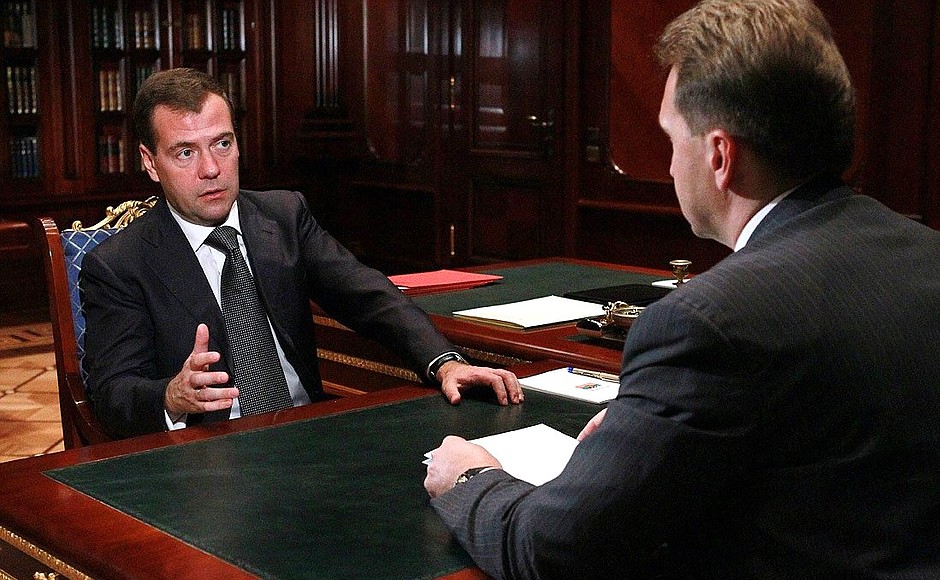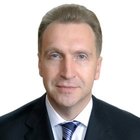
* * *
Excerpts from transcript of meeting with Igor Shuvalov
President of Russia Dmitry Medvedev: Mr Shuvalov, you have been giving the Far East a lot of attention of late. This is good, because this is a remote, important and complicated region. Parts of the Far Eastern Federal District suffer from a chronic lack of attention, unfortunately, but at the same time, substantial funds are flowing into the region now through the programme for organising the Asia-Pacific Economic Cooperation summit. These programmes have brought with them various funds aimed at raising the quality of life in Primorye Territory and some of the other regions. I would like to hear your views on the overall results, on what has proved effective, and what problems still remain. Go ahead.
First Deputy Prime Minister Igor Shuvalov: Mr President, you also give this region plenty of attention and visit the Far East often. You were in Primorye Territory only recently. Through the extra financing it has put into Primorye Territory the Government has done more for this region in the last few years than in the entire previous decade. There had been no big investment projects in the region and infrastructure had been in a lamentable state. Even when the financial crisis in autumn 2008 forced us to start cutting budget spending, not a single penny was cut from the federal targeted programmes for Primorye Territory, and funding has continued to be allocated in full and as planned.
See also
We are carrying out many different activities right now, not just in Primorye Territory, but in other parts of the Far East too. The Government has until the end of this year to complete work on drafting the State Programme for Developing the Far East and Trans-Baikal. This programme will then be approved next year and will be launched as a budget instrument in 2013.
My colleagues and I have visited various municipalities in the region, including several small municipalities in Primorye Territory. People there have a number of questions. Large amounts of federal money have been spent on major infrastructure projects and on developing the university there. People realise now that all of this is not for the APEC summit but for the region’s people. The APEC summit is just the event in time for which all of these facilities will begin their operation. But people ask, what will happen with the region once this amount of investment stops coming in? They want to know if the state authorities plan to spend any more money on developing the region. And they ask about the housing and utility sector’s future. This is their greatest concern. Primorye Territory faces all of the same problems that were discussed yesterday. But they also face the problem of particularly high energy bills, mostly because, as you know, the local energy systems depend on fuel oil. These high energy costs are approximately 50-percent subsidised by the regional budget.
There is also the problem of obsolete housing stock. Buildings have not undergone complete renovation for long years. Let me say, Mr President, that the Housing and Utilities Sector Reform Fund’s project for financing and co-financing complete overhaul of housing stock and related infrastructure using federal resources has everyone’s support. People see that this programme is producing real results.
Dmitry Medvedev: Yes, when I was in Vladivostok, I saw the real work going on in the city and its environs, and so buildings really are being renovated thanks to this Fund’s efforts.
Igor Shuvalov: On your instruction the Government is allocating to the Fund additional 22 billion rubles ($700 million) from our extra revenues for this work this year. But people in Primorye Territory and other Far East regions want the authorities to consider granting the Fund further financing in order to keep it operating after January 1, 2013.
Dmitry Medvedev: People in other parts of the country are seeking the same thing.
Igor Shuvalov: Mr President, people are grateful for this programme and say that it shows that the authorities are taking genuine interest in offering people even in the more remote parts of the country decent housing conditions. We will be able to see the programme’s results over the course of the year.
The next big question is that of municipal and federal roads. There is active road construction going on around the country now, but there are some populated areas where roads are not being laid, not being repaired, or are in a bad state.
Another issue of concern is the state of healthcare facilities and education sector facilities. People want to know if the federal government plans to co-finance regional programmes to get hospitals and schools into decent shape, and if the authorities intend to support specific education or healthcare projects.
Dmitry Medvedev: What proposals do you have on these matters?
Igor Shuvalov: We think that the State Programme for Developing the Far-East and Trans-Baikal should set its specific projects, objectives and activities in accordance, above all, with local people’s demands. This means concentrating on the housing and utilities sector, building roads, and the education and healthcare sectors. The large investment projects that are required not just at local level but that also contribute to overall federal development should be a separate component. We have discussed this matter in the Government, and have not yet reached a consolidated position, but it looks likely that we will have to increase financing for these programmes starting in 2015.
Dmitry Medvedev: I see. I think the most important thing is to make sure that what we hear on people’s lips at times does not turn into the real political situation. What am I referring to here? You’ve no doubt heard yourself how some people in the region, even senior officials, say, ‘In Russia it’s such and such a situation, but here it’s such and such’. This is a warning sign, and we must make sure that all of our national programmes are carried out in every part of the country.
But there are some parts of the country in need of priority attention and close involvement: they include the Far East, Primorye Territory, and a number of the other regions in the Far Eastern Federal District. Why, because, as you rightly said, there was a chronic lack of financing in many sectors in the 1990s. The housing and utilities sector was completely neglected. It was already in a dilapidated state, but after the 1990s, and even over this last decade, it has really been facing a very serious situation indeed. Then there is the healthcare system, healthcare employees, the education system and the teachers working there, and the region’s infrastructure. All of the four main concerns that you mentioned are extremely important for the Far East’s harmonious development as part of our unified Russia. We must put the necessary investment into this.
As for the future of specific programmes, I think the programme to renovate housing stock and resettle people out of old housing stock has proved very successful. I am not saying this as the president, looking down from on high, but on the basis of my conversations with people on the ground. They say themselves that this programme is working, that their building entrances are completely different now with new doors, new window frames, the old smells gone. And the same goes for roads, healthcare, and education, of course.
In other words, complete the work on preparing the programme and draft the final proposals for me to decide on. I think it is very right and proper that you continue to make inspections and keep watch on the preparations not just for the APEC summit, but on the efforts in general to develop the Far East. I think that in the future it will be a good thing to have specific deputy prime ministers concentrate on development efforts in big regions or federal districts. I think this practice has proved its worth.
Igor Shuvalov: We will keep working.
Dmitry Medvedev: Thank you.
